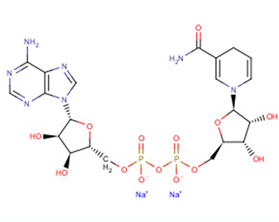
NADH disodium salt hydrate
CAS No. 606-68-8
NADH disodium salt hydrate( Disodium NADH | NADH disodium salt )
Catalog No. M19981 CAS No. 606-68-8
NADH is the reduced form of nicotinamide adenine dinucleotide (NAD) that can donate electrons as part of a reducing reaction. In that process NADH becomes oxidized to produce NAD+. A variety of enzymes use NADH plus H+ to reduce substrates generating NAD+ as well as the reduced product.
Purity : >98% (HPLC)
 COA
COA
 Datasheet
Datasheet
 HNMR
HNMR
 HPLC
HPLC
 MSDS
MSDS
 Handing Instructions
Handing Instructions
| Size | Price / USD | Stock | Quantity |
| 500MG | 43 | In Stock |


|
| 1G | 52 | In Stock |


|
Biological Information
-
Product NameNADH disodium salt hydrate
-
NoteResearch use only, not for human use.
-
Brief DescriptionNADH is the reduced form of nicotinamide adenine dinucleotide (NAD) that can donate electrons as part of a reducing reaction. In that process NADH becomes oxidized to produce NAD+. A variety of enzymes use NADH plus H+ to reduce substrates generating NAD+ as well as the reduced product.
-
DescriptionNADH is the reduced form of nicotinamide adenine dinucleotide (NAD) that can donate electrons as part of a reducing reaction. In that process NADH becomes oxidized to produce NAD+. A variety of enzymes use NADH plus H+ to reduce substrates generating NAD+ as well as the reduced product.
-
In Vitro——
-
In VivoAnimal Model:Male ICR mice Dosage:5 μmol/mouse Administration:Intraperitoneal injection or oral administration, once Result:Produced significant increases in urinary excretions of nicotinamide (Nam) with intraperitoneal injection. Oral administration did not produce any increases in Nam or its metabolites.Animal Model:Male C57BL/6J mice Dosage:500 mg/kg Administration:Intragastric administration, 15 min before ethanol administration Result:Significantly increased blood acetaldehyde levels in mice administered with alcohol between 30 min and two hours. Significantly reduced the acetaldehyde in the blood after two hours. Inhibited the decrease of NAD+/NADH redox ratio in hepatocytes.
-
SynonymsDisodium NADH | NADH disodium salt
-
PathwayOthers
-
TargetOther Targets
-
RecptorOthers
-
Research Area——
-
Indication——
Chemical Information
-
CAS Number606-68-8
-
Formula Weight709.4
-
Molecular FormulaC21H27N7Na2O14P2
-
Purity>98% (HPLC)
-
SolubilityDMSO:42.3 mM
-
SMILES[Na+].[Na+].NC(=O)C1=CN(C=CC1)[C@@H]1O[C@H](COP([O-])(=O)OP([O-])(=O)OC[C@H]2O[C@H]([C@H](O)[C@@H]2O)n2cnc3c(N)ncnc23)[C@@H](O)[C@H]1O
-
Chemical Name——
Shipping & Storage Information
-
Storage(-20℃)
-
ShippingWith Ice Pack
-
Stability≥ 2 years
Reference
1.Kim MS et al. Enzymatic properties of the membrane-bound NADH oxidase system in the aerobic respiratory chain of Bacillus cereus. J Biochem Mol Biol. 2004 Nov 30;37(6):753-6.
molnova catalog



related products
-
tert-Butyl5-bromo-1H...
Tert-Butyl5-bromo-1H-indole-1-carboxylate (N-Boc-5-bromoindole) is an indole derivative with therapeutic potential for pain, inflammation, and other conditions.
-
G-R-G-E-T-P
G-R-G-E-T-P
-
Cadazolid
Cadazolid is an oxazolidinone-type antibiotic, with activity against gram-positive bacteria, including Clostridium difficile.



 Cart
Cart
 sales@molnova.com
sales@molnova.com


